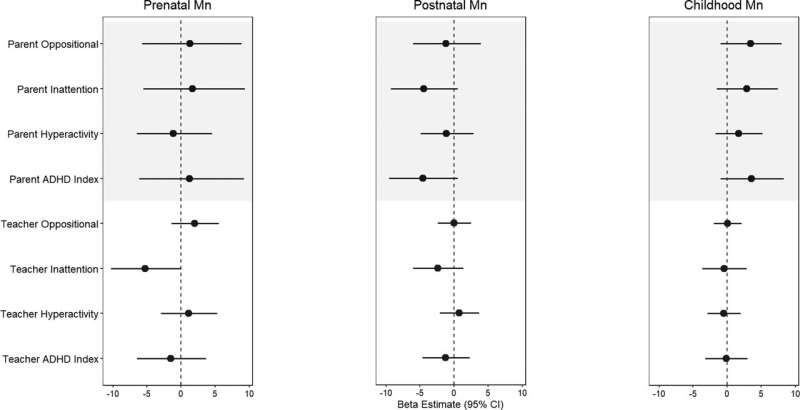This article has been reviewed according to Science X's editorial process and policies. Editors have highlighted the following attributes while ensuring the content's credibility:
fact-checked
trusted source
proofread
Early-life exposure to manganese may be beneficial to adolescent cognition

Manganese is both an essential nutrient and a toxic chemical, primarily obtained through diet, water, supplements, and environmental elements. But the level at which manganese shifts from beneficial to harmful to the developing brain remains unclear. Children's susceptibility to the neurotoxic effects of manganese may vary based on when they are exposed to this metal in their lifetime.
A new study led by Boston University School of Public Health (BUSPH) researchers explored this timing of manganese exposure among children and found that manganese exposure early in life may be beneficial for verbal learning and memory during adolescence.
Published in the journal Neurotoxicology and Teratology, the study measured manganese levels through teeth and found that prenatal tooth manganese was linked with fewer memory and learning errors in adolescents, and childhood tooth manganese was linked with better memory recall. Postnatal tooth manganese (from birth to age 1), however, was not associated with adolescent memory.
The study is the first to analyze manganese exposure from the prenatal period through early childhood in relation to verbal learning and memory in later childhood. The findings validate the importance of the timing of manganese exposure in understanding how this metal may affect neurodevelopment and cognition.
"While most associations in our study were null, there was some evidence that manganese is beneficial for verbal learning and memory in adolescence," says study senior author Birgit Claus Henn, associate professor of environmental health at BUSPH. "In early life, it makes sense that we might need more manganese for growth and healthy development, but as we get older, the need for manganese might change."
The study's lead author is Alexa Friedman, a doctoral student at SPH at the time of the analysis. For the study, Claus Henn, Friedman, and colleagues utilized data from 2007 to 2014 among 140 Italian adolescents ages 10–14 in the Public Health Impact of Metals Exposure (PHIME) study, a cohort that investigates the health effects of manganese exposure from nearby ferroalloy production.
They examined records of the adolescents' baby teeth from the second trimester through ~age 6 as a marker of manganese exposure, as well as results from neurobehavioral assessments.
"One of the strengths of this study was the use of naturally shed baby teeth to measure manganese exposure to the fetus, which is otherwise difficult to estimate," Claus Henn says, adding that in past studies she has utilized biospecimens from the mother or from the baby at birth.
"The tooth biomarker allowed us to measure retrospective exposure during multiple exposure periods spanning distinct developmental stages, thus allowing us to evaluate associations in a prospective manner and to establish temporality between exposure to manganese and neurobehavioral outcomes."
Manganese associations with verbal learning and memory also differed by gender in the results, with stronger beneficial associations among male adolescents for both prenatal and childhood manganese exposure.
One possible explanation for the null associations between postnatal tooth manganese and adolescent memory could be that children in the first year of life may not be as sensitive to manganese-related changes in adolescent cognition as children in the prenatal or childhood exposure periods, the researchers say.
Claus Henn is also senior author of another new study, published in the journal Environmental Epidemiology, which examined tooth manganese and attention-related behaviors among Italian adolescents. The findings showed that prenatal manganese was similarly beneficial for adolescent behavior, but postnatal and childhood manganese were not—in fact, postnatal manganese was associated with worse behavior scores.
Future studies should examine these early-life manganese associations among larger study groups, as well as explore how manganese levels in teeth relate to manganese levels in the environment and in our diets, including drinking water, Claus Henn says.
"We know that manganese levels in teeth reflect levels in the environment, but it would be nice to tie those more directly back to levels in water, air, diet, and other sources, so that we can make recommendations about safe and/or optimal levels of exposure—particularly during critical life stages of pregnancy and childhood," she says. "It would also be useful to look more comprehensively at impacts on the brain, because verbal learning and memory is just one aspect of neurobehavioral functioning."
More information: Alexa Friedman et al, Early-life manganese exposure during multiple developmental periods and adolescent verbal learning and memory, Neurotoxicology and Teratology (2023). DOI: 10.1016/j.ntt.2023.107307
Schildroth, Samanthaa et al, Early life manganese exposure and reported attention-related behaviors in Italian adolescents, Environmental Epidemiology (2023). DOI: 10.1097/EE9.0000000000000274 journals.lww.com/environepidem … _and_reported.1.aspx


















